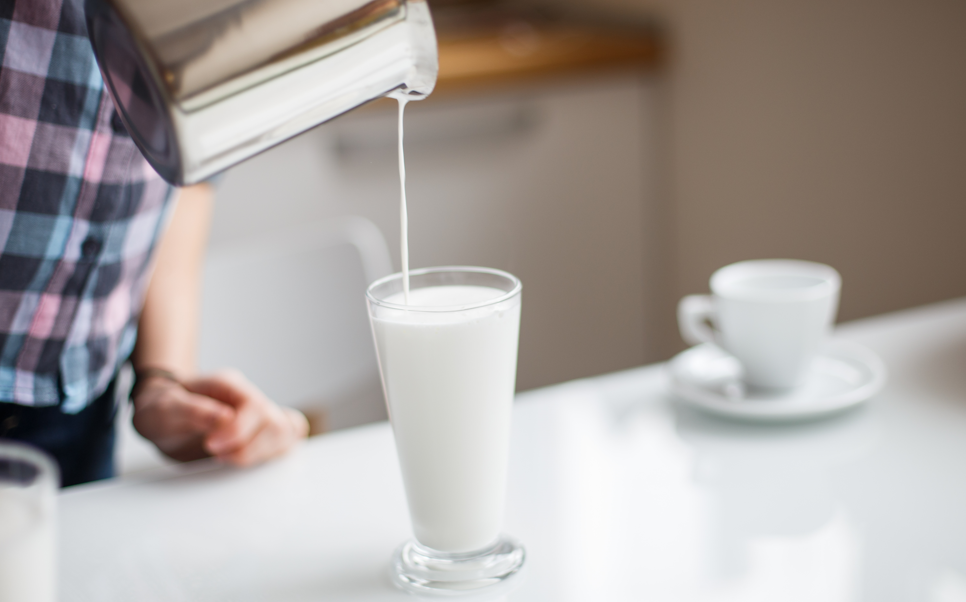This podcast was aired on the Weekends with Joanne Vrakas show on CJAD.
Joanne Vrakas: We’re diving into a topic that sparks a lot of debate: milk! Is it good for us, or should we consider plant-based alternatives? But there are people who argue that milk isn’t necessary or can even be harmful. What’s the evidence around that?
Kim Arrey: This is an exciting topic because milk and especially fermented dairy products have been a staple in diets for centuries.
Joanne Vrakas: Let’s start with cow’s milk. What are some of the benefits it offers?
Kim Arrey: Cow’s milk is a powerhouse of nutrients. It’s an excellent source of high-quality protein, calcium, and it is fortified with vitamin D, nutrients that promote bone health, especially in children and in adults. It has potassium, which supports heart health and keeps your blood pressure in check. The vitamin D that you get from milk is also involved in reducing the risk of developing asthma and upper respiratory tract infections.
Joanne Vrakas: I thought that milk causes inflammation and that could lead to more coughing. Is that true?
Kim Arrey: Some people do have an allergy to the protein in cow’s milk or and other are lactose intolerance. Lactose intolerance is not an allergy but it occurs when your body does not produce enough lactase, the enzyme needed to breakdown lactose so it can be digested. Milk is considered to be one of the most allergenic foods. But that does not mean that consuming milk or other dairy products will increase everyone’s level of inflammation. The foods that cause inflammation are very individual and will depend on your genes, and your gut microbiota, so even identical twins will have different foods that cause inflammation.
Joanne Vrakas: What about the plant-based products. Can they replace milk for people with milk allergies or intolerance?
Kim Arrey: Plant-based beverages do not contain the same amount or quality of protein as animal-based milks. Soy beverages is the only plant-based milk that contains similar amounts of protein as cow, or goat milk. If you choose other plant-based beverages make sure you are consuming enough protein from other food sources. Plant-based beverages often do not contain the same amount of calcium, or vitamin D, so be sure that they have been supplemented with these nutrients. Some plant-based beverages contain a lot of added sugar so be aware and read the labels to make sure you are getting the sugar free versions.
Joanne Vrakas: That’s helpful! Are there any downsides to plant-based milks that people should be aware of?
Kim Arrey: Some plant-based beverages may have additives like emulsifiers and stabilizers, which some individuals may wish to avoid. People with nut allergies should be cautious with almond or cashew milk.
Joanne Vrakas: What about gut health? Is there any research comparing the effects of cow’s milk and plant-based milks on gut microbiota?
Kim Arrey: Absolutely! Recent studies have show that both cow’s milk and certain plant-based milks can influence gut microbiota, but in different ways.
Cow’s milk has proteins and lactose that help increase the growth of beneficial bacteria, like Lactobacillus and Bifidobacterium. These bacteria make fatty acids that are anti-inflammatory and increase healthy gut.
Some plant-based milks can also help with gut health, especially those high in fiber, like oat milk. The soluble fibre in these milks is like prebiotics that feed good bacteria. But it’s important to note that not all plant-based milks are the same.
Some plant-based milks, like those that are not properly processed or stored, can increase bad bacteria. If plant-based milks are made from nuts or seeds that have been contaminated, harmful bacteria like Salmonella or E. coli can grow more. This can lead to gastrointestinal issues.
This reminds me of the listeria outbreak in Canada, in late 2021, from some brands of plant-based milks. This outbreak resulted in several hospitalizations, with at least 10 reported cases. This is why it is important to ensure safe food processing practices, and another consideration when consuming plant-based alternatives to milk.
On the other hand, the very processed plant milks also lack diverse kinds of healthy bacteria found in whole foods, which can imbalance the bacteria in the gut. This causes inflammation and eve digestive disorders.
Milk can be a nutritious choice for many, but consider your individual dietary needs and preferences. Whether you choose cow’s milk or plant-based alternatives, focusing on a balanced diet. And remember, it is always a good idea to consult with a healthcare provider or dietitian if you have concerns or restrictions.

